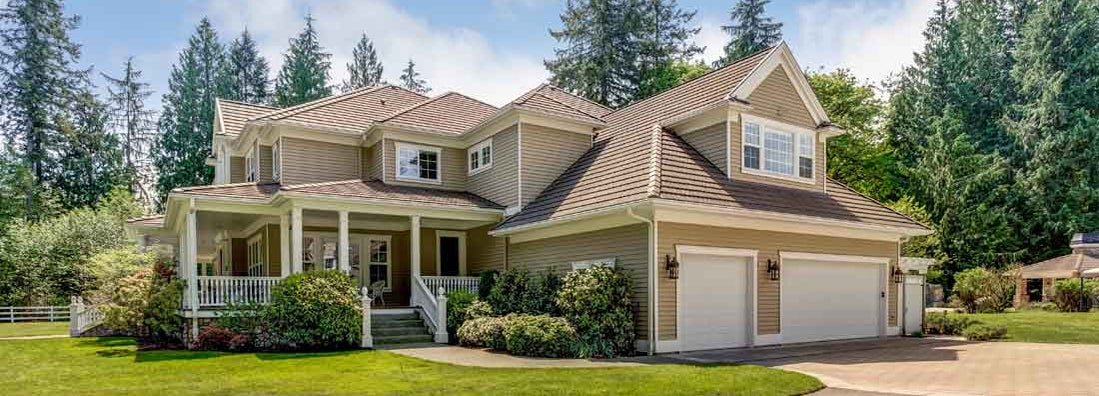Best Amount of Home Insurance for You
(Learn all about the coverages you need to protect your family and assets)

For most people, the home is their most valuable asset. To protect this asset, purchasing a homeowners insurance policy is not only designed to pay for repairs and replacements, but it also protects your long-term savings and investments. But what do you need and where do you start.
Consult an independent insurance agent today to learn more about your current homeowners policy or if you’re looking to purchase a policy that meets your needs. Independent insurance agents can offer unbiased help to determine how much insurance you should have for your home and other topics that you may not be aware of.
Understanding Homeowners Insurance
To begin, a homeowners policy is a type of insurance package that includes a group of policies. These policies are designed to cover the structural elements of your house, its contents, and other associated buildings on the property.
Homeowners policies typically include:
- Dwelling coverage
- Personal property coverage
- Personal liability coverage
- Medical payments coverage
- Other structures coverage
- Additional living expenses (ALE) coverage
Dwelling coverage
This provides replacement and repair coverage for your home and attached structures such as a garage, awning, or carport.
Personal property coverage
This covers the contents of your home such as furniture and clothing. Be aware that high-ticket items, such as high-end electronics and jewelry, may need separate scheduled property coverage to be reimbursed.
Personal liability coverage
Personal liability coverage is multifaceted coverage for your home, its occupants, and even your pets. First, it helps pay claims and legal fees when someone sustains an injury in your house or on your property. As an example, if a person slips on your steps, your personal liability policy could help pay an award, court costs, and/or legal fees following a lawsuit. Second, liability coverage can protect you from libel and slander claims where another party may have felt that you were defaming their character.
Note that If you own property and or have investments and savings that are worth more than the liability limits in your policy, it may be a wise choice to purchase a separate excess liability policy or an umbrella policy (see below).
Medical payments coverage
If an individual who doesn’t live in your home sustains an injury on your property, your medical payments coverage can help pay related medical expenses. This coverage is also useful to avoid litigation, as medical payments policies typically pay even when you aren’t at fault.
Other structures coverage
Other structures coverage repairs and replaced unattached structures that become damaged on your property including detached garages, fences, or sheds.
Additional living expenses (ALE) coverage
If you are displaced from your home following a qualifying catastrophe, such as a house fire or a severe storm, additional living expenses (ALE) policies pay to rent a temporary dwelling while your house is being repaired. ALE includes the additional costs of temporarily living elsewhere, like hotel bills, restaurant meals, and other living expenses.
Furthermore, if you rent out a part of your home that was affected by the catastrophe, ALE coverage also reimburses you for the rent that you would have collected from your tenant if your home hadn’t been damaged/destroyed.
Additional policies are available as riders and optional coverages to increase the level of protection your home needs. These include:
Flood insurance
Flood insurance pays for damages and losses caused by floods. It is not usually included in most homeowners policies nor is it available from most insurers. Instead, flood insurance can be purchased through the National Flood Insurance Program (NFIP), administered by the Federal Emergency Management Agency (FEMA).
Earthquake insurance
Similar to flood insurance, earthquake insurance pays for damages and losses caused by earthquakes. However, more insurers offer separate policies or endorsements that cover your home against earthquake damage.
Umbrella coverage
If you need extra liability coverage, umbrella coverage is the right choice. Even though most homeowners insurance policies provide a minimum of $100,000 worth of liability insurance, this may not be enough to cover substantial lawsuits and legal costs. By choosing an umbrella coverage policy, your coverage kicks in when your original homeowners insurance coverage runs out.
Speak with an independent insurance agent to find out how much insurance you will need and which types of coverage best fit your unique circumstances.
How Much Homeowners Insurance Do I Need?
Determining the amount of homeowners coverage you need requires careful calculation and consideration. This is a multi-faceted problem, as you must not only create an itemized inventory of the value of your home’s belongings, but also make sure coverage limits are enough and deductibles are kept affordable.
The following are a few things to think about to help make sure you get an adequate amount of coverage:
Cost of rebuilding
First, you'll want the coverage limits on your homeowners policy to be high enough to cover the cost of rebuilding your home. To get an idea of these costs, it’s important to speak with a professional home inspector or appraiser to determine your home’s worth.
Local construction costs and the square footage of your home play the biggest role in replacement cost, but you should also factor in the value of the following items:
- The style of the home
- The number of rooms/bathrooms
- Roofing type and materials used
- Other attached and unattached structures on the premises, such as garages, sheds, awnings, etc.
- The type of exterior wall construction
- Valuable architectural features, such as fireplaces, exterior trim, or arched windows
- Whether the house was custom built
- Amenities, such as a sauna or hot-tub
Getting your home up to code
Furthermore, building inspectors may also require you to upgrade your home if there are new building codes put into effect since your home was built. For example, an inspector might require you to replace ungrounded electrical outlets (i.e. knob-tube) with modern grounded outlets, which you can request a price estimate for during inspection. Some insurers offer endorsements to dwelling policies that help pay expenses related to meeting current building codes, so be sure to review your policy for this occurrence.
Natural disaster risk
For those who are at risk for natural disasters, having insurance policies specific to the risk can make sure that you’re covered. Most homeowners policies don’t include this coverage and may specifically exclude damage from natural disasters unless you buy additional coverage.
Conduct a home inventory
Conduct a home inventory of your personal possessions. It’s important to itemize as much as possible, keeping documents, pictures, serial numbers, and more safe to get an accurate estimate. Also, this document will be useful if and when you need to file a claim, cutting out the guesswork should your home be damaged, vandalized, and so forth.
Coverage for expensive items
Expensive items usually require scheduled coverage to adequately reimburse their value in the event of their loss. This includes computers, jewelry, electronics, and wide range of items, so be sure to carefully review your insurance policy for policy limits and exclusions.
Rental rates
If your home sustains major damage and becomes uninhabitable, you could spend weeks or months living in temporary housing while it is being repaired. That’s why it’s important to estimate how much it will cost for you and your family to rent a temporary home or apartment in your area. Obviously, those who live in high-rent housing markets, such as New York City or San Francisco, need more additional living expenses coverage and should find applicable coverage that can last for at least three months.
How to Find the Best Coverage for Your Home
Insurance can be complex, and searching through options can be confusing, time-consuming, and frustrating. An independent insurance agent's role is to simplify the process.
When it comes time to purchase insurance or add extra coverage, they’ll break down all the jargon and explain the nitty-gritty so you understand exactly what you're getting.
And should you need to file a claim, you’re not alone. Your agent will be right there to help guide you through every last step and get your life back to where it all was. How great is that?
Why Online Quotes Aren’t Always the Best Way to Shop
Getting your insurance quotes online can be tempting. Sure, it’s fast and easy, but are the quotes you are getting actually accurate? And are you getting quotes for all the different types of coverage your business needs?
Online quotes cannot give you the whole picture. They often omit important coverage, which may result in you being unable to get compensation if something disastrous happens. And they can leave out cost-saving opportunities such as discounts and bundling opportunities that an independent agent can help you take advantage of.
Instead of getting an online quote, find an independent insurance agent near you, and schedule a one-on-one consultation to discuss your options for the best coverage for your home.
Benefits of an Independent Insurance Agent
Independent insurance agents have access to multiple insurance companies, ultimately finding you the best coverage, accessibility and competitive pricing while working for you. Find an independent insurance agent in your community here.
https://www.bankrate.com/insurance/homeowners-insurance/how-much-homeowners-insurance/
https://www.iii.org/article/how-much-homeowners-insurance-do-you-need
